Synthesis and Lessons Learned: Networks for Agri-Food Transformation Project
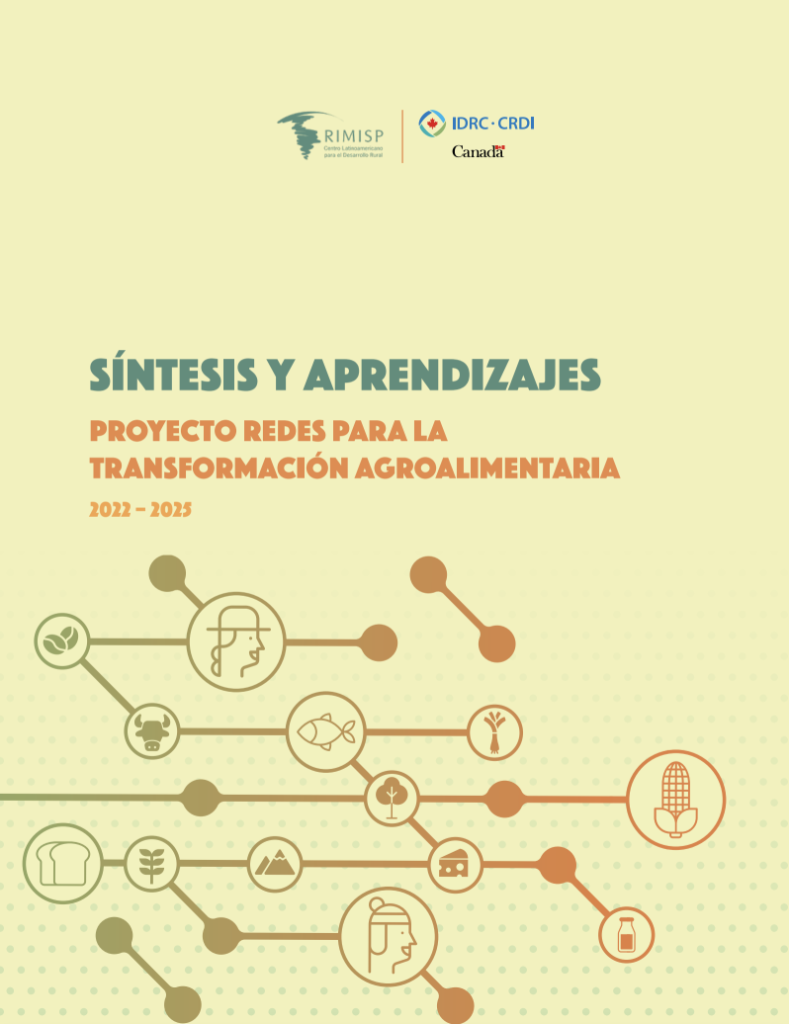
This document presents the main lessons learned from the project implemented
in three indigenous territories in Latin America
together with three partner organizations: CESDER-PRODES in Sierra Norte de Puebla, Mexico; APROBA-SANK in Alta Verapaz, Guatemala; and PROSUCO in the municipality of Torotoro, Bolivia.
The three initiatives were developed in territories characterized by a high proportion of indigenous population, being mostly rural, facing unfavorable socioeconomic conditions compared to the respective national averages and the presence of socio-environmental conflicts related to land and water, and experiencing migratory dynamics associated with livelihoods.
Missing Links: Addressing the Research Gap on the Hidden Middle in Agrifood Systems
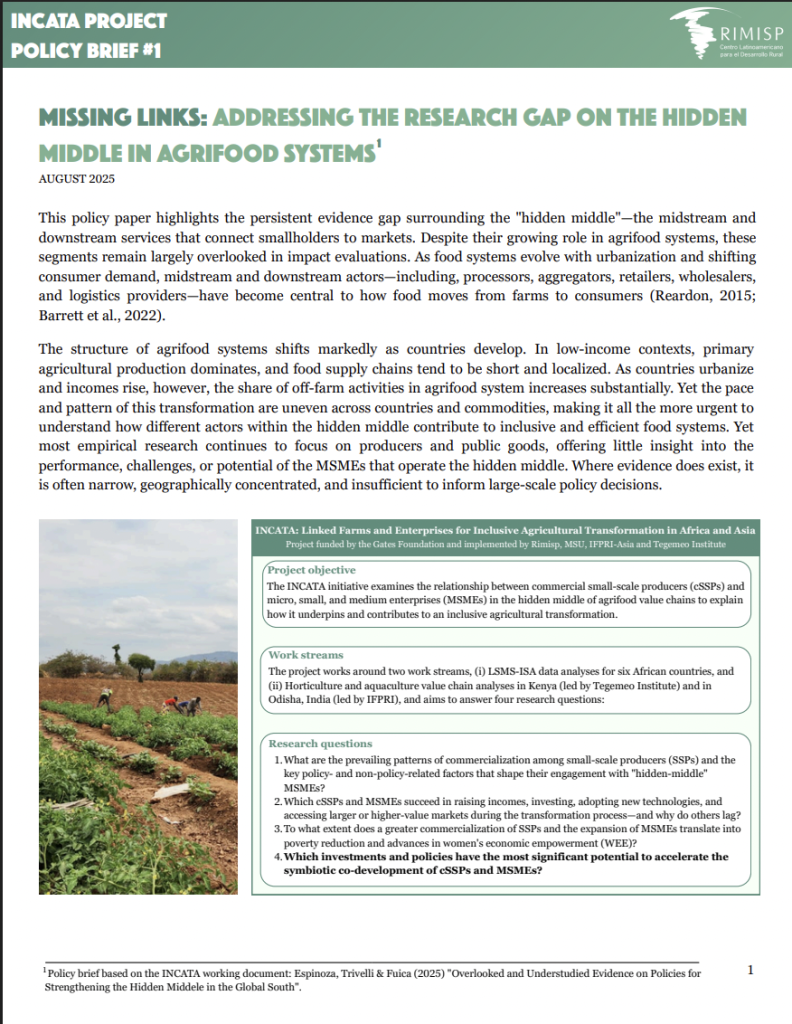
This policy paper highlights the persistent evidence gap surrounding the “hidden middle”—the midstream and
downstream services that connect smallholders to markets. Despite their growing role in agrifood systems, these
segments remain largely overlooked in impact evaluations. As food systems evolve with urbanization and shifting
consumer demand, midstream and downstream actors—including, processors, aggregators, retailers, wholesalers,
and logistics providers—have become central to how food moves from farms to consumers (Reardon, 2015;
Barrett et al., 2022).
Incentives for diversified agriculture as a strategy for overcoming poverty in rural contexts
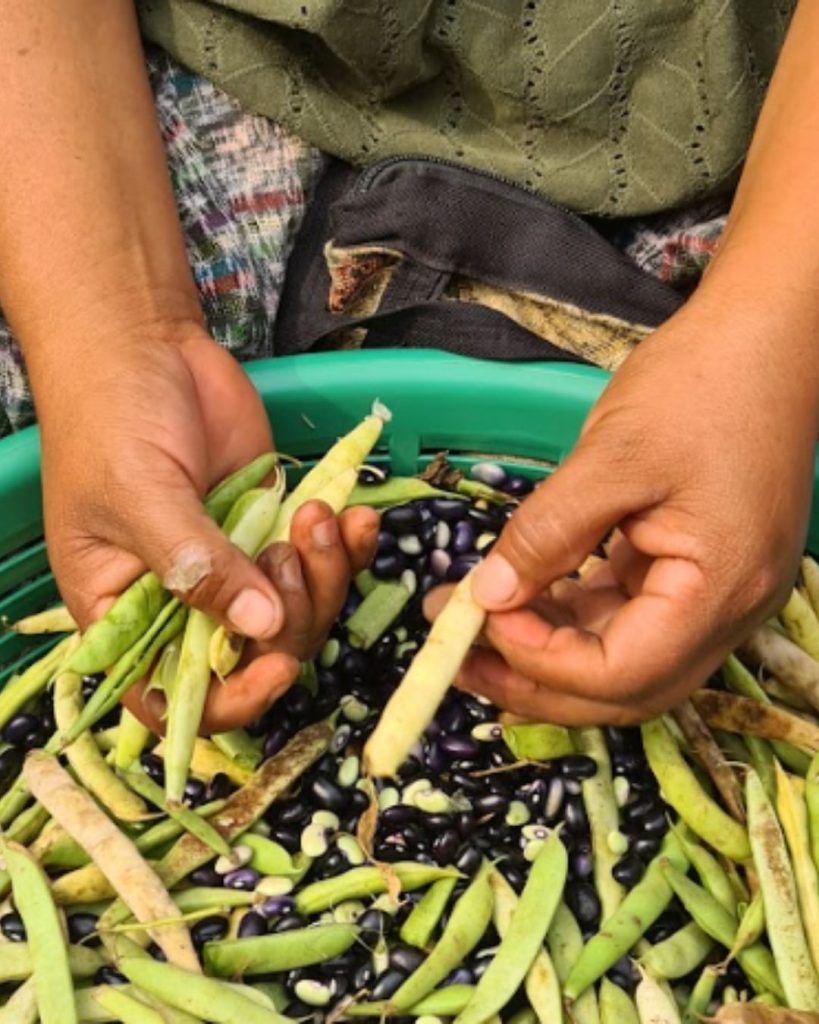
Since 2021, Rimisp has accompanied the indigenous civil association APROBA SANK, who have been working with Mayan Q’eqchi’ communities and authorities for over 20 years in Alta Verapaz, Guatemala. SANK, in its mission to improve living conditions and achieve greater autonomy for local communities, has proposed the establishment of an Incentive Program for Diversified Peasant Production (PIN-Campesino).
Fostering the participation of indigenous families and communities in agroecological transitions: Experiences from three territories in Bolivia, Guatemala and Mexico
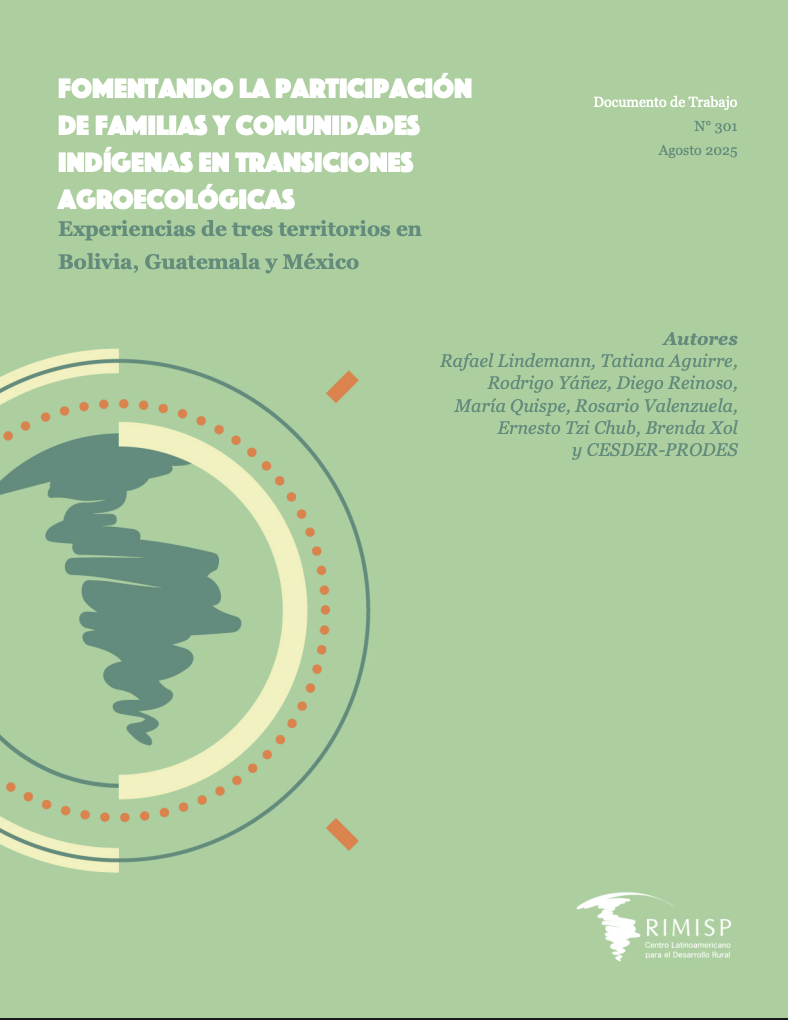
Agroecology distinguishes itself from other approaches to sustainable agriculture by focusing on the protagonism of family farmers and peasant and indigenous grassroots organizations in the processes of food systems transformation. This study explores various strategies to promote the participation of these communities in agroecological transitions in indigenous territories in Mexico, Guatemala and Bolivia.
Indigenous agro-food systems in transition: Experiences from three territories in Bolivia, Guatemala and Mexico

This study explores the dynamics of indigenous agri-food systems in transition in three Latin American territories: Sierra Norte de Puebla (Mexico), Alta Verapaz (Guatemala), and Torotoro (Bolivia). Through surveys of 569 indigenous farmers, it examines how local communities respond to the pressures of climate change, socioeconomic vulnerability, and market integration. The results reveal high levels of pluriactivity, self-production of food for household consumption, and significant dependence on local markets, along with increasing environmental risks such as drought and soil degradation. In the context of adverse conditions, households maintain agroecological practices such as crop diversification and the conservation of native seeds, while using conventional agricultural inputs to maintain productivity. The findings illustrate that indigenous agri-food systems are not static but rather adopt hybrid strategies that combine tradition and modernity to ensure livelihoods and food security in increasingly uncertain contexts.
The Four Indigenous Directions: Towards a Governance of Planet Earth in Balance

This document is based on Ken Paul’s presentation on sustainable governance of planet Earth and
the oceans for the meeting “Transformation of food systems: perspectives of indigenous peoples
and nations of the Americas” held in Yunguilla, Ecuador, with the participation of representatives
of indigenous peoples and nations of the Americas.
Indigenous Rights in Latin America: Main Tools and the Challenges of their Implementation

This document is based on Kelly Ulcuango’s presentation on indigenous rights for the meeting
“Transformation of food systems: perspectives of indigenous peoples and nations of the Americas”
held in Yunguilla, Ecuador, with the participation of representatives of indigenous peoples and
nations of the Americas.
Between the desire to act and the reality of achieving the objective. Tensions of indigenous rural youth regarding agroecology
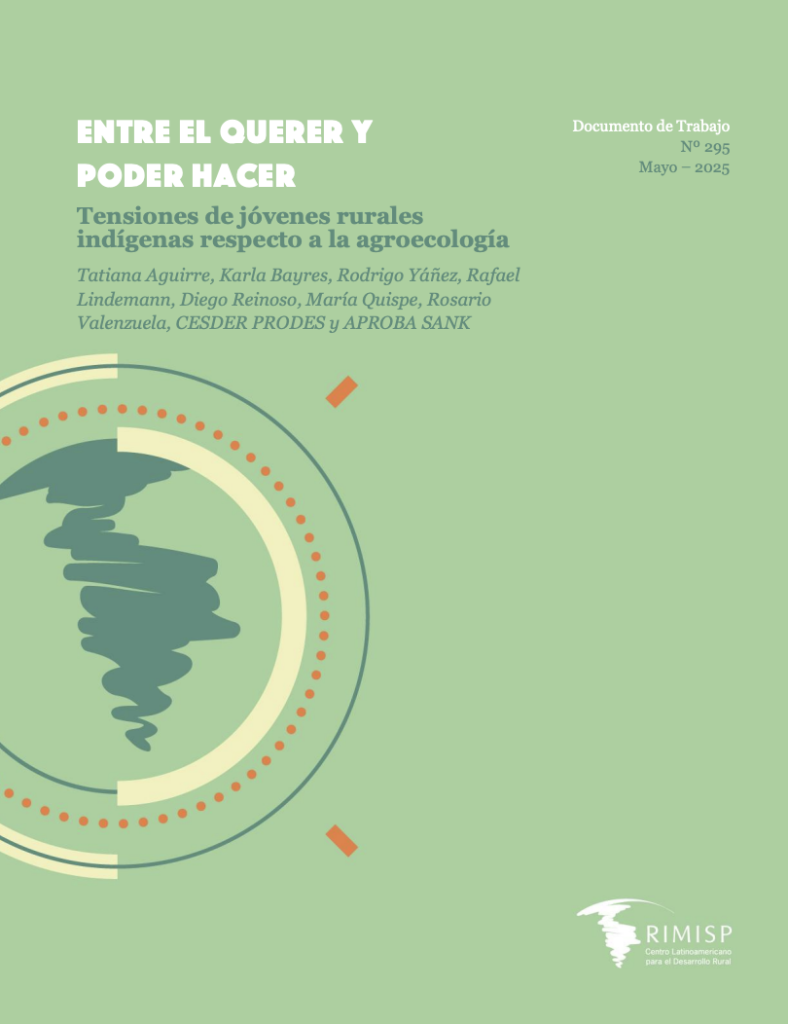
This study explores the tensions faced by rural indigenous youth in Latin America with respect to agroecology in three territories: Sierra Norte de Puebla (Mexico), Alta Verapaz (Guatemala) and Torotoro (Bolivia). The objective was to understand how these young people perceive agroecology and the barriers they face in implementing it. A qualitative methodology was employed, including participatory visual techniques (photovoice) and semi-structured interviews with 22 youth who participated in a leadership training program. Key findings revealed four critical problem areas: (1) the conflict between the desire for healthy, chemical-free agriculture and the predominant use of agrochemicals; (2) the gap between learning agroecological techniques and the lack of land or decision-making power to apply them; (3) valuing traditional food systems while increasingly consuming processed foods; and (4) skepticism about the scalability of agroecology amidst generational disenchantment with rural life. The study highlights the need for policies that address access to land, inclusion of youth, and innovative approaches to make agroecology viable for younger generations.
Evaluation of Results of the Rural Women Programme, agreement INDAP – PRODEMU 2022-2024
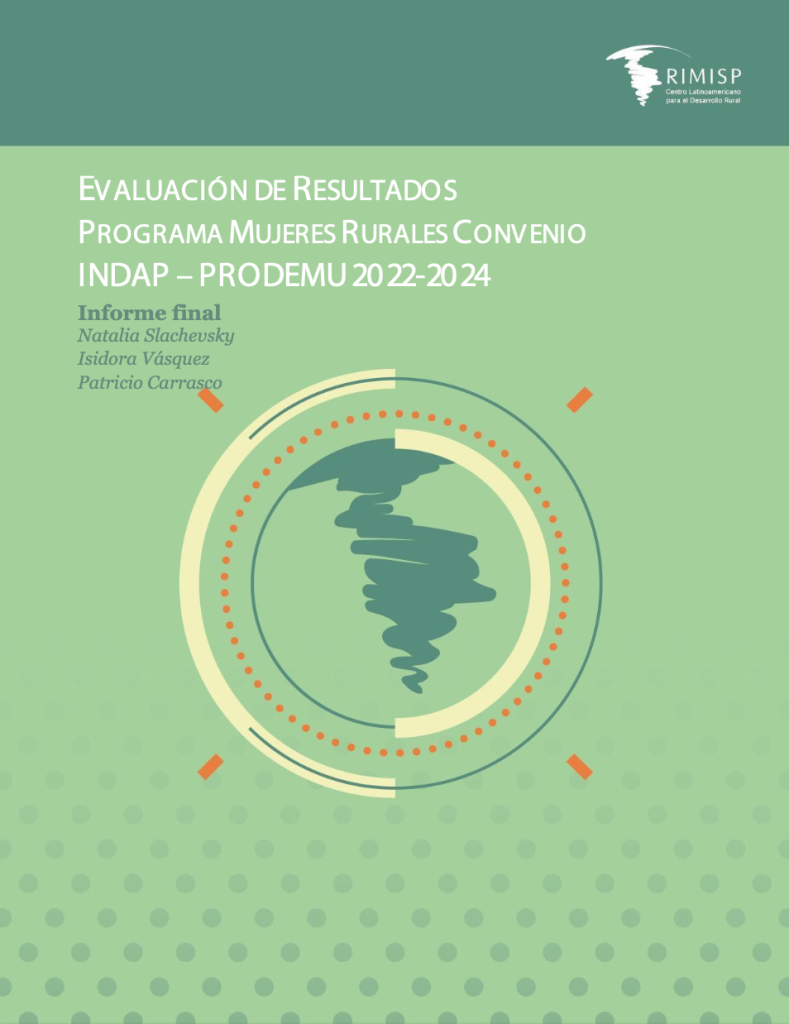
El presente documento corresponde al Informe final del estudio “Evaluación de Resultados
Programa Mujeres Rurales Convenio INDAP – PRODEMU 2022-2024”, cuyo desarrollo se
enmarca en la licitación privada solicitada por la Fundación para la Promoción y Desarrollo de la
Mujer (en adelante PRODEMU). El objetivo del estudio, según se especifica en los términos de
referencia y bases administrativas del mismo, consiste en “evaluar con enfoque de género los
resultados de la ejecución e indicador de propósito del programa Mujeres Rurales,
correspondiente a la cohorte 2022 – 2024”.
Rimisp 2024 Annual Report
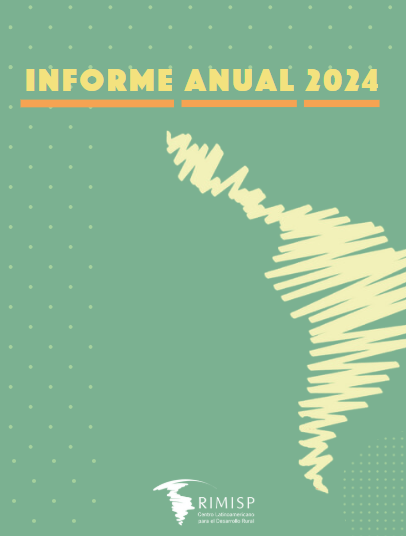
This document provides an overview of the work carried out during the year. It is divided into sections: projects, activities, publications, press and digital media management, donors and Rimisp’s network of partners.